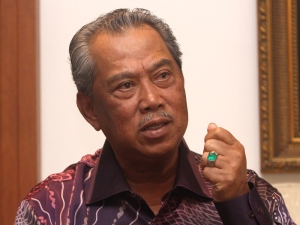Pakatan won’t recognise UEC, Muhyiddin warns

(The Star) – Tan Sri Muhyiddin Yassin has warned that no one should expect the Pakatan Harapan opposition coalition to recognise the Unified Examination Certificate (UEC) if it comes to power in the next general election.
“If the Pakatan Harapan could form the next federal government, it would still maintain the stand that there should not be conflict with national education when handling the application (to recognise UEC),” he said in an interview with Sin Chew Daily.
He said the Dong Jiao Zong – which comprises Dong Zong (United Chinese School Committees’ Association) and Jiao Zong (United Chinese School Teachers’ Association) – must accept the amendments proposed by the Government, such as adding History.
The UEC is a standardised examination conducted by the Dong Zong in the country’s 60 Chinese independent secondary schools. After studying for three years, students will sit for the junior UEC exam, and after six years, they will sit for the senior UEC exam.
The former education minister said that “this issue concerned the country’s education policy which stresses on single-language teaching and examination model, which is not new”.
He said the Government had allowed the UEC holders with Sijil Pelajaran Malaysia to apply to public universities or teachers’ training colleges when he was the Education Minister.
Muhyiddin urged Dong Jiao Zong not to play hardball, but to weigh in certain factors when fighting to get recognition for UEC.
“As I know, Dong Jiao Jong is too extreme. You have to be moderate. If possible, accept the revision suggestions. (Then) include the History subject. The examination of Chinese independent schools is still UEC. This is more in accordance with the Malaysian spirit.
“Because as of now, the syllabus and exam do not reflect national values,” he said.
Over 800 universities in the world open their doors to UEC students, including top-ranking institutions such as the California Institute of Technology, Harvard University, Oxford University, University of Cambridge, University of Toronto, University of Tokyo, National University of Singapore, University of Hong Kong, University of Melbourne, Peking University and Kyoto University.
Among foreign countries, Taiwan took in the largest number of UEC students, with Singapore ranking second. The other favourite destinations of the 2013 batch were Australia, Britain and China.
Last year, MCA president Datuk Seri Liow Tiong Lai said MCA vigorously pushed for recognition of the UEC, which will help develop Malaysia into a multi-education country.
He said the UEC needed further discussion with the relevant ministries, saying that “this is a technical process and should be given ample time to ensure that the people are given different choices”.
During the MCA’s 63rd annual general assembly last November, the resolution on the UEC stated that certificate-holders could apply for entry into local universities.

